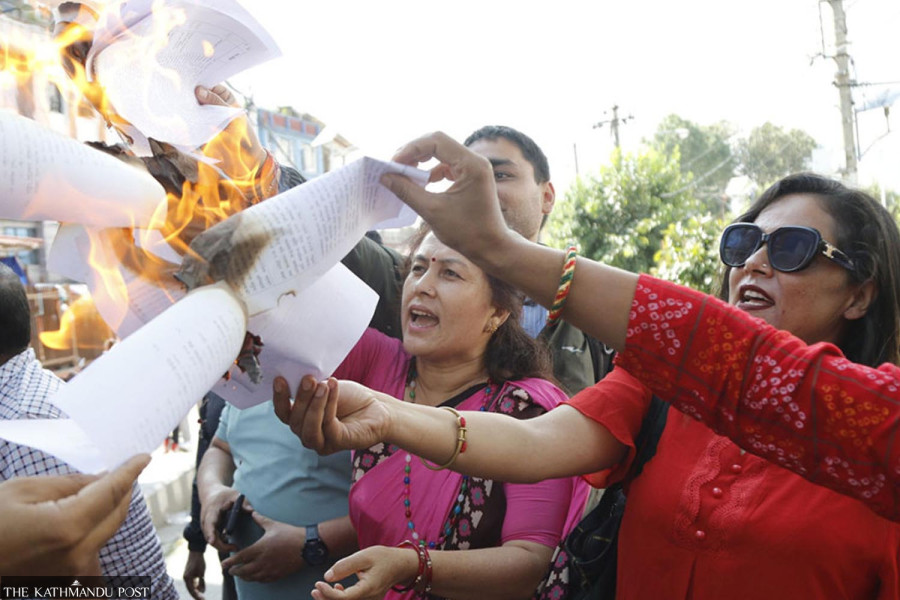National
Teachers to strike nationwide, 7 million students to be hit
They are unhappy with a federal bill’s provisions allowing local units to recruit, transfer and promote teachers.
Binod Ghimire
Rejecting the call for dialogue from the Ministry of Education, Science and Technology, the Nepal Teachers’ Federation, an elected body of teachers across the country, is set to launch a protest against the school education bill obstructing the teaching-learning activities starting Wednesday.
The protest will affect the studies of seven million students in 34,000 schools, of which 6,000 are private. Over 20 percent of the students are enrolled in private schools.
The bill has met with criticism from several quarters since it was registered in the House of Representatives on September 13. The federation, which demonstrated against the bill on Friday, announced a series of protests starting Wednesday by closing schools.
Issuing a statement, the federation has accused the government of deceiving the teachers by going against past agreements. “The government has bypassed previous agreements while drafting the bill. It seems it has taken our concerns very lightly,” Kamala Tuladhar, chairperson of the federation, told the Post.
With no sign of the teachers withdrawing their protest, the ministry on Monday invited them for a meeting on Tuesday. The federation turned down the offer, saying they will not sit for dialogue in a meeting led by the education minister. Ashok Rai of the Rastriya Janata Party leads the education ministry.
As they have been deceived in the past, Tuladhar said the federation will sit for dialogue only if the government-panel is led by the prime minister himself. “Until the prime minister returns, the acting prime minister can lead the panel with the participation of education, law and finance ministers. The chief whips of all major parties must be present in the dialogue,” she told the Post. “This is why we rejected the dialogue called by the education ministry.”
The federation has presented an 18-point demand and is particularly unhappy with the provisions that will allow local units to recruit, transfer and demote or promote teachers. The authority to transfer and evaluate teachers also lies with the local units. The federation wants the authority to remain with the federal government.
Protesting teachers argue that there will be no job security if the responsibility of managing teachers is given to local governments. Last year, the government signed a deal with the federation agreeing to keep the public school teachers under the federal government’s jurisdiction.
Laxmi Kishor Subedi, general secretary of the federation, said there will be no uniformity in teacher appointment if all 753 local governments get authority to appoint them. He claimed that the move will worsen the quality of teaching. The education bill says principals in all 29,000 public schools will be appointed by a panel with representation from respective local governments and district education offices. “This will breed favouritism in the appointment process,” Subedi told the Post.
The job security of the temporary teachers, schools staff, early childhood development teachers, and pay, perks and retirement benefits of teachers are the other concerns the federation has listed in its 18-point demand.
“Our protest will be Kathmandu-centric. We have called teachers from districts to come to the Capital for the protest,” said Tuladhar. “As Wednesday is a public holiday, the teaching-learning in schools will be obstructed from Thursday.” Around 230,000 teachers, under different categories, are involved in school-level teaching.
Teachers from private schools too are joining the protest though they have yet to decide whether or not to obstruct the teaching-learning process. They have asked for pay and perks on par with their counterparts in public schools. The bill says their payment will be determined by the local governments concerned.
“We are very much part of the protest. We are looking for commitment from umbrella bodies of private schools to support our concerns. If they make a commitment, the schools will not be closed. If not, we will be forced to close private schools across the nation,” Hom Kumar Thapa, chairperson of the Institutional Schools Teachers’ Union, told the Post. “The bill must be revised.”
The teachers recruited under the relief quota too are hitting the streets objecting to the provision of allowing only half of the quota teachers to compete internally for permanent postings. All 40,000 teachers under the relief quota must be allowed to participate in internal competition and there must be a golden handshake for those who don’t qualify, they have said.
Local governments, meanwhile, argue that the teachers’ demands are unconstitutional.
Khim Bahadur Thapa, general secretary of the National Association of the Rural Municipalities in Nepal, said as the constitution clearly says all the authority to manage school education lies with local governments, it is natural that they will manage school teachers as well. “The demands of the teacher’s federation are unconstitutional, and in contravention of schedule 8 of the constitution that allows the local governments to oversee the entire school education,” he told the Post.




 10.12°C Kathmandu
10.12°C Kathmandu















